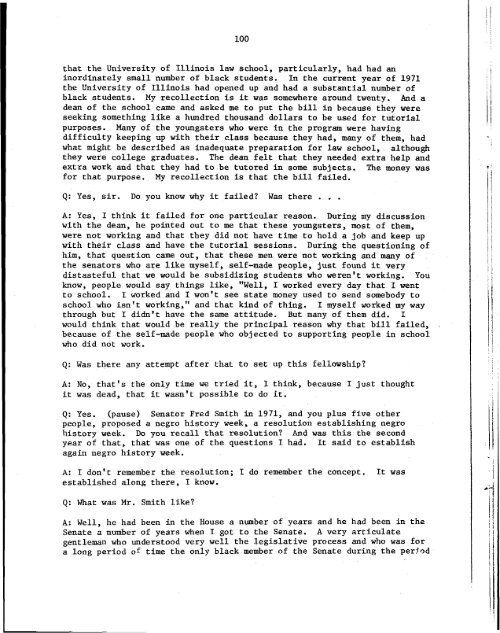Cecil A. Partee Memoir - University of Illinois Springfield
Cecil A. Partee Memoir - University of Illinois Springfield
Cecil A. Partee Memoir - University of Illinois Springfield
You also want an ePaper? Increase the reach of your titles
YUMPU automatically turns print PDFs into web optimized ePapers that Google loves.
that the <strong>University</strong> <strong>of</strong> <strong>Illinois</strong> law school, particularly, had had an<br />
inordinately small number <strong>of</strong> black students. In the current year <strong>of</strong> 1971<br />
the <strong>University</strong> <strong>of</strong> <strong>Illinois</strong> had opened up and had a substantial number <strong>of</strong><br />
black students. My .recollection is it was somewhere around twenty. And a<br />
dean <strong>of</strong> the school came and asked me to put the bill in because they were<br />
seeking something like a hundred thousand dollars to be used for tutorial<br />
purposes. Many <strong>of</strong> the youngsters who were in the program were having<br />
difficulty keeping up with their class because they had, many <strong>of</strong> them, had<br />
what might be described as inadequate preparation for law school, although<br />
they were college graduates. The dean felt that they needed extra help and<br />
extra work and that they had to be tutored in some subjects. The money was<br />
for that purpose. My recollection is that the bill failed.<br />
Q: Yes, sir. Do you know why it failed? Was there . , .<br />
A: Yes, I think it failed for one particular reason. During my discussion<br />
with the dean, he pointed out to me that these youngsters, mast <strong>of</strong> them,<br />
were not working and that they did not have time to hold a job and keep up<br />
with their class and have the tutorial sessions. During the questioping <strong>of</strong><br />
him, that question came out, that these men were not working and many <strong>of</strong><br />
the senators wha are like myself, self-made people, just found it very<br />
distasteful that we would be subsidizing students who weren't working. You<br />
know, people would say things like, ''Well, I worked every day that I went<br />
to school. I worked and I won't see state money used to send somebody to<br />
school who isn't working," and that kind <strong>of</strong> thing. I myself worked my way<br />
through but I didn't have the same attitude. But many <strong>of</strong> them did. I<br />
would think that would be really the principal reason why that bill failed,<br />
because <strong>of</strong> the self-made people who objected to supporting people in school<br />
who did not work.<br />
Q: Was there any attempt after that to set up this fellowship?<br />
A: No, that's the only time we tried it, I think, because I just thought<br />
it was dead, that it wasn't possible to do it.<br />
Q: Yes. (pause) Senator Fred Smith in 1971, and you plus five other<br />
people, proposed a negro history week, a resolution establishing negro<br />
history week. Do you recall that resolution? And was this the second<br />
year <strong>of</strong> that, that was one <strong>of</strong> the questions I had. It said to establish<br />
again negro history week.<br />
A: I don't remember the resolution; I do remember the concept. It was<br />
established along there, I know.<br />
Q: What was Mr. Smith like?<br />
A: Well, he had been in the House a number <strong>of</strong> years and he had been in the<br />
Senate a number <strong>of</strong> years when I got to the Senate. A very articulate<br />
gentleman who understood very well the legislative process and who was for<br />
a long period <strong>of</strong> time the only black member <strong>of</strong> the Senate during the period
















